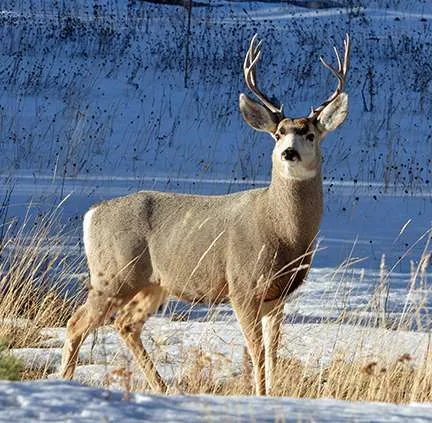After hunting for several years now from our permanent, enclosed, raised deer blind, I often take it for granted, forgetting the good, the bad and the ugly experiences of hunting deer any other way. Today, however, as I searched the cobweb cluttered attic of my mind for this week’s column, I felt a new appreciation for our nice raised blind as memories of deer hunts early in our marriage came up. Don’t ask me how I can remember any of these when I can’t remember now what I had for breakfast this morning, but here are some memories from a particular deer hunt in southwestern KS many years ago when we still hunted as a couple from a small portable ground blind.
By flashlight, we again settled into our respective camp chairs, unzipped each shooting window slightly, and prepared to greet a new day through these narrow slits in our hunting blind. Since Joyce and I often hunted together, this blind was a worthy investment. It was lightweight, quick and easy to set up, provided camouflage and protection from the wind, plus allowed for a little more noise and movement than if we merely sat in an open stand. It served another purpose as well. Even a slight breeze made enough natural noise that it allowed us to talk in quiet whispers, and talk we did. When stepping into the blind for another morning or evening of hunting, the adrenalin flowed briskly for a time, and all was business. But gradually we relaxed, and the thoughts that were born in the solitude were given voice.
My wife’s designing mind was usually going full speed. We hunted in an area of Kansas where both Whitetail and Mule Deer existed side by side, and, despite what you have heard or read, distinguishing between the two species is not so easy on very short notice. We verbally designed a deck of “flash” cards, which would show comparative views of both species, male and female, side by side, for quick reference. We designed new and better hunting blinds and stands, as well as made improvements to our own. To ours, we imagined adding removable drapes made of netting that would hang over the windows, and pouches sewn to the inside walls for storage of binoculars, etc. Joyce mentally designed and built folding camp chairs with swivel seats that could be raised and lowered, and with more padding! We also custom designed hunting clothing; from gloves with inner pouches to hold heat packets, to outer clothing with insulation that would automatically shrink or swell according to the temperature.
Occasionally, after a time of watching deer that we couldn’t shoot, we’d get a bit silly, and begin imagining conversations between them. For instance, one morning a nice Mule Deer doe grazed for several minutes on the wheat, not 30 yards away. Having “Whitetail Only” tags, we watched in silence. Deciding to have some fun with the situation, we began concocting a story that had all the neighborhood deer drawing tumbleweeds to see which one would walk onto the wheat as a decoy so the rest could slip away unseen. Ole’ Mable, now in front of us, drew the short tumbleweed, so there she stood while the rest of her buddies crept away and awaited her fate.
On the serious side, we both felt this time was good for our relationship. Activities enjoyed together always seem to draw people closer, and somehow, the silence of the hunt drowned out all the usual cares and conversations, clearing the way for discussion (in whispers) of subjects we didn’t often tackle.
I think that every presidential cabinet meeting, United Nations Assembly, world summits and especially congressional meetings should be held in a huge hunting blind. Who knows what diseases may be cured, what discoveries could be made, which mortal enemies might shake hands again and maybe congress would even get something accomplished…or maybe not! Continue to Explore Kansas Outdoors!
Steve can be contacted by email at stevegilliland@idkcom.net





